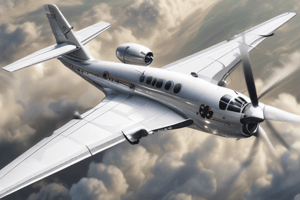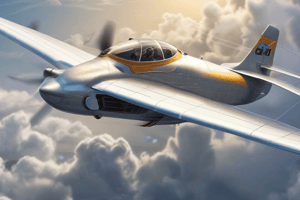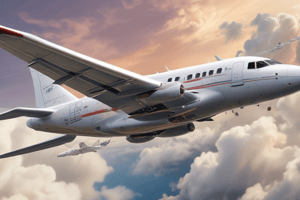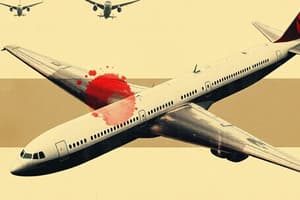Podcast
Questions and Answers
What occurs when lift and weight are equal in an aircraft during straight and level flight?
What occurs when lift and weight are equal in an aircraft during straight and level flight?
- The aircraft will accelerate.
- The aircraft will neither gain nor lose altitude. (correct)
- The aircraft will descend.
- The aircraft will climb.
Which action will result in an increase of thrust in an aircraft?
Which action will result in an increase of thrust in an aircraft?
- Decreasing throttle.
- Reducing airspeed.
- Applying more throttle. (correct)
- Increasing drag.
What happens when drag exceeds thrust in straight and level flight?
What happens when drag exceeds thrust in straight and level flight?
- The aircraft will descend. (correct)
- The aircraft will stall.
- The aircraft maintains a constant speed.
- The aircraft will climb.
Which atmospheric condition is likely to affect an aircraft's performance?
Which atmospheric condition is likely to affect an aircraft's performance?
What typically occurs when the thrust of the propeller momentarily exceeds drag?
What typically occurs when the thrust of the propeller momentarily exceeds drag?
If an aircraft's weight increases while lift remains constant, what is the likely outcome?
If an aircraft's weight increases while lift remains constant, what is the likely outcome?
Which factor is controlled via the throttle in an aircraft?
Which factor is controlled via the throttle in an aircraft?
In which scenario does the airspeed of an aircraft stabilize?
In which scenario does the airspeed of an aircraft stabilize?
Which of the following is NOT one of the three rotational axes of an aircraft?
Which of the following is NOT one of the three rotational axes of an aircraft?
What movement does the ailerons control in an aircraft?
What movement does the ailerons control in an aircraft?
What is the primary control surface that influences the pitch of an aircraft?
What is the primary control surface that influences the pitch of an aircraft?
During a turn, what is the typical effect of adverse yaw?
During a turn, what is the typical effect of adverse yaw?
What type of surface is typically used to control yaw in an aircraft?
What type of surface is typically used to control yaw in an aircraft?
Which statement about ailerons is true?
Which statement about ailerons is true?
What mechanism is used to control ailerons in flight?
What mechanism is used to control ailerons in flight?
What is the role of the stabilator in some aircraft?
What is the role of the stabilator in some aircraft?
What effect does an increase in altitude have on takeoff roll?
What effect does an increase in altitude have on takeoff roll?
How does temperature affect engine power output on a hot day compared to a cold day?
How does temperature affect engine power output on a hot day compared to a cold day?
What is a consequence of increased humidity on aircraft performance?
What is a consequence of increased humidity on aircraft performance?
At high elevation airfields under hot and humid conditions, what can be expected regarding aircraft performance?
At high elevation airfields under hot and humid conditions, what can be expected regarding aircraft performance?
What happens to landing speed on a hot day compared to a cold day?
What happens to landing speed on a hot day compared to a cold day?
Which of the following best describes the effect of altitude on an aircraft's climb performance?
Which of the following best describes the effect of altitude on an aircraft's climb performance?
What impact does a cold winter day have on atmospheric density compared to a hot summer day?
What impact does a cold winter day have on atmospheric density compared to a hot summer day?
How does increased humidity specifically affect the performance of an aircraft?
How does increased humidity specifically affect the performance of an aircraft?
What is the primary purpose of extending flaps on an aircraft?
What is the primary purpose of extending flaps on an aircraft?
Which of the following methods is NOT used to adjust flaps?
Which of the following methods is NOT used to adjust flaps?
What happens to the wing area when flaps are extended?
What happens to the wing area when flaps are extended?
In which phase of flight are flaps mostly utilized?
In which phase of flight are flaps mostly utilized?
Which of these forces does NOT act on a helicopter during flight?
Which of these forces does NOT act on a helicopter during flight?
What role does the collective control play in helicopter operations?
What role does the collective control play in helicopter operations?
How do rotor blades generate lift in a helicopter?
How do rotor blades generate lift in a helicopter?
Which statement best describes the relationship of lift and weight during a hover in a helicopter?
Which statement best describes the relationship of lift and weight during a hover in a helicopter?
What is one potential outcome of carburetor ice formation?
What is one potential outcome of carburetor ice formation?
Under what environmental conditions is carburetor icing most likely to occur?
Under what environmental conditions is carburetor icing most likely to occur?
What is a primary action to take for combating carburetor ice?
What is a primary action to take for combating carburetor ice?
Which type of failure might result in a loss of flaps on some aircraft?
Which type of failure might result in a loss of flaps on some aircraft?
What type of failure would most likely affect landing gear operations?
What type of failure would most likely affect landing gear operations?
What is a possible result of engine failure in an aircraft?
What is a possible result of engine failure in an aircraft?
What typically indicates an engine fire to the pilot?
What typically indicates an engine fire to the pilot?
What should air traffic controllers prioritize in the event of a complete electrical failure?
What should air traffic controllers prioritize in the event of a complete electrical failure?
Flashcards are hidden until you start studying
Study Notes
Lift and Weight
- In straight and level flight, lift and weight are balanced.
- If lift is greater than weight, the aircraft will climb.
- If weight is greater than lift, the aircraft will descend.
Thrust and Drag
- In straight and level flight, thrust and drag are equal in magnitude.
- Thrust is controlled by the throttle.
- Increasing the throttle increases thrust.
- When thrust exceeds drag, airspeed will increase.
- As airspeed increases, drag rapidly increases, until thrust and drag become equal, and airspeed becomes constant.
Effects of Altitude
- An increase in altitude decreases atmospheric pressure, increasing density altitude.
- Increased density altitude results in:
- Longer takeoff roll
- Reduced climb performance
- Longer landing roll
- Decreased engine power
Effects of Temperature
- Hot air is less dense than cold air
- On a hot day, compared to a cold day:
- Takeoff roll is longer
- Rate of climb is slower
- Landing speed is faster
- Engine power output is decreased
Effects of Humidity
- Humid air is less dense than dry air.
- On a humid day, compared to a dry day:
- Takeoff roll is longer
- Rate of climb is slower
- Landing speed is faster
- Engine power output is decreased
Aircraft Rotational Axes
- An aircraft has three rotational axes:
- Roll
- Pitch
- Yaw
Primary Control Surfaces
- Control of the aircraft about its three axes of rotation is affected by the primary control surfaces:
- Ailerons control roll.
- Elevator controls pitch.
- Rudder controls yaw.
Ailerons
- Ailerons are hinged surfaces mounted on the outboard trailing edge of the wings. They rotate the aircraft around the longitudinal axis.
- Left and right ailerons move simultaneously but in opposite directions.
- Moving ailerons induces adverse yaw, which is the tendency of the nose to yaw in the opposite direction of the turn.
- Adverse yaw is caused by the drag of the "down" aileron.
Elevator
- The elevator is a hinged surface located on the rear of the horizontal stabilizer.
- The elevator rotates the aircraft around the lateral axis.
- The elevator controls the pitch and angle of attack of the aircraft.
- On some aircraft, the entire horizontal tail surface moves, known as a stabilator.
Flaps
- Flaps extend on both wings simultaneously.
- Flaps increase camber, and on some aircraft, increase wing area, which:
- Increases lift
- Increases drag
- Lowers stall speed
- Allows steeper approach to runway without increased speed
Helicopter Aerodynamics
- The forces acting on helicopters are the same as fixed-wing aircraft:
- Lift
- Thrust
- Weight
- Drag
- Lift is provided by the rotor blades, which are shaped like an airfoil.
- Bernoulli’s Principle applies.
- When rotor blades are in motion, they act as a wing.
- RPMs and blade pitch control:
- Vertical ascent (lift > weight)
- Hovering (lift = weight)
- Vertical descent (weight > lift)
Helicopter Controls
- Throttle controls the RPMs
- Collective controls the pitch of the rotor blade, which affects lift.
Carburetor Ice
- Carburetor ice can form between 20-70° F in conditions of high humidity.
- Lowered pressure and vaporization in the carburetor lowers the temperature of the fuel/air mixture, causing water vapor or moisture to freeze.
Aircraft System Failures
- Aircraft system failures can occur due to:
- Electrical failures
- Mechanical failures
- Hydraulic failure
- Engine failure
- Engine fire
Electrical Failure
- Partial electrical failure affects some instruments and systems.
- Complete electrical failure results in a loss of:
- Some instruments
- Flaps on some aircraft
- Radios and navigation and transponder equipment
- Lights
Mechanical Failure
- Mechanical failures can occur in:
- Landing gear
- Tires
- Wheels
- Panels
- Flight controls
- Windshield
Hydraulic Failure
- Hydraulic failure affects landing gear, flaps, and brakes on some aircraft.
Engine Failure
-
Engine failure may affect:
- Engine-driven vacuum system for instruments
- Hydraulic power
- Electrical power
- Pressurization
-
Engine failure can result in:
- Loss of altitude
- Forced landing
Engine Fire
- An engine fire is usually controllable.
- Indication to the pilot of an engine fire is via the fire warning light.
- Cabin/cockpit fires are extremely serious.
- Air traffic controllers should assist pilots with any of these situations by:
- Providing information about the nearest suitable airport for landing.
- Providing priority handling and clearing conflicting traffic.
- Alerting emergency equipment.
- Informing the pilot of any available resources.
- Notifying their supervisor of the situation.
Studying That Suits You
Use AI to generate personalized quizzes and flashcards to suit your learning preferences.





